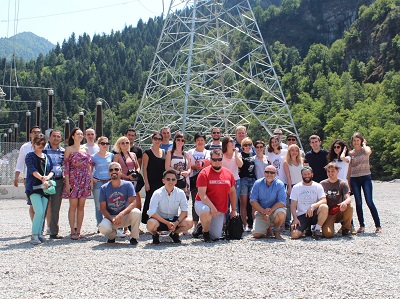Georgia is a favorable investment destination, with a simple tax code consisting of six flat taxes and a total tax rate of only 16% on commercial profits that are distributed. Georgia was ranked 16th on the World Banks Ease of Doing Business for 2017 (by contrast, Switzerland is No. 31 and Norway No. 6), and No. 13 on the Bribery Risk Scale of the “Trace”, an International Transparency Rank (Switzerland is No. 16 and Norway No. 5). Georgia has signed an Association Agreement with the EU, is a member of WHO, has ratified the Energy Charter Treaty and signed the New York Convention.
On Sunday July 16 2017, participants of the ISET Summer School of Reformers visited the Shuakhevi Hydro Power Plant developed by Adjaristsqali Georgia LLC (AGL), a company set up specifically for this purpose as a joint venture between India’s Tata Power and Norway's Clean Energy Invest (with shares of 40% each), and IFC (with 20 %). A presentation made by the CEO of AGL, Mr. Prashant Joshi, CEO of AGL; Mr. Josh Gerard, Project Manager of AGL; and Mr. Zviad Diasamidze, the head of Corporate Responsibility of AGL. This was followed by a tour of the Power House, the Dam and the Reservoir, during which the AGL representatives explained the project’s cycle, showed maps of the facilities, and shared AGL’s impressive initiatives for improving the lives of people living in the area of construction.
The Shuakhevi HPP, the total project cost of which is over USD 420 mln., is the largest hydro project to have been developed in Georgia since its independence with a capacity of 187 MW, and the first project in Georgia to be registered through the Clean Development Mechanism (CDM), generating 265,000 Certified Emission Reductions (CER’s) pa, equivalent to 265 000 tons of CO2. The Shuakhevi Project is also the first cross-border project intending to sell electricity to both Turkey (throughout the year) and Georgia (throughout the winter, during a period of energy deficit).
Construction of the Shuakhevi HPP launched in 2013. As part of this project, two weirs with their respective reservoirs and dams were constructed, along with diversion tunnels to channel the water. The total length of the Shuakhevi HPP tunnel system (the second longest structure of this type in the world) is 37 km, which is twice as long as the combined length of all HPP tunnels built in Georgia, and a total of 730 Georgian citizens were employed in the construction process.
The Shuakhevi HPP project has played a crucial role in the development of Georgia’s energy sector and in nurturing young Georgian engineers. Most of the project’s former interns from the Georgian Technical University are now company employees. As part of its corporate social responsibility program, AGL has implemented over 70 social projects with an overall budget of 3 million USD, most of which were planned as public-private partnerships. Beyond engineering, the company also provided local communities with such educational opportunities as language courses, training in the principles of accounting, and business consulting for newly-opened enterprises. AGL is actively promoting gender equality, and also invests in projects raising the business capacity of Adjara, such as the construction of Georgia’s largest alpine botanic garden in the Goderdzi tourist area in order to promote tourism.











